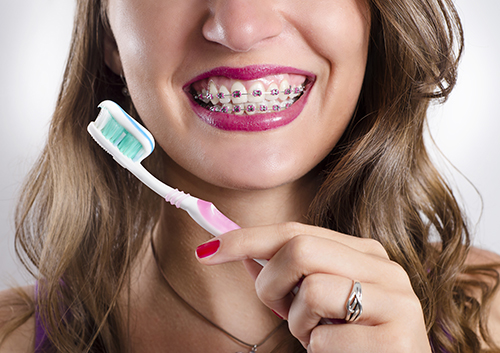I Have Gum Disease. Can I Still Get Braces?
May 27th, 2020

Gum disease is one of our most common dental diseases, affecting both children and adults. If you are considering getting braces or aligners, make sure your gums are their healthiest before beginning orthodontic treatment.
- Gingivitis
For both younger and older patients, gingivitis (mild gum disease) can be the result of poor brushing and flossing habits. When plaque builds up around the teeth and gums, it irritates delicate gum tissue. The gums become inflamed, and symptoms such as redness, swelling, tenderness, bleeding, and bad breath can result. Usually, your dentist can treat early stages of gingivitis with tips on more efficient brushing and flossing, a professional cleaning, and suggestions for mouth rinses if needed.
Because brushing and flossing with braces can be more difficult, you need to devote special attention to your cleaning routine to prevent gingivitis from developing after you start treatment. Talk to us any time about how to brush and floss most effectively when you wear braces. Dr. Robee Bailey Jr., DMD can also recommend tools designed especially for braces wearers to get your teeth and gums as clean and plaque-free as possible. If you are a candidate for clear aligners, this option can make it easier to keep your teeth their cleanest. We’ll work with you to keep your gums healthy as your orthodontic work takes place.
- Periodontitis
For older patients, gingivitis, left untreated, can eventually lead to periodontitis (severe gum disease). This chronic infection can lead to the formation of pockets between your gums and teeth that become home to bacteria and infection. Over time, periodontitis can lead to the destruction of gum, ligament, and bone tissue. Left untreated, it can lead to loose teeth and even bone and tooth loss.
Making sure you schedule regular dental exams will allow your dentist or periodontist to detect and treat any signs of periodontitis as early as possible. If you have any of the symptoms of gum disease, it’s important to treat the cause of these symptoms as soon as possible to protect your gums, bone, and teeth. Deep cleaning procedures such as scaling and root planing, topical and oral antibiotics, and oral surgeries such as flap surgery or bone and tissue grafting can help reverse the effects of periodontitis.
Because orthodontic treatment involves moving the teeth and re-forming the ligament and bone tissue, which hold them in place, you need healthy periodontal ligaments and bones to begin treatment. If you have suffered shifting teeth or bone loss due to periodontitis, talk to us. We will let you know at your visit to our Concord, NC office if you are a good candidate for orthodontic work, and which type of appliance is best for your periodontal health.
We are happy to talk to you about the best way to achieve an attractive smile and a healthy bite if gum disease has been a problem in the past. Most important, we want to make sure that your teeth and gums are their healthiest even before you begin orthodontic treatment. Preventing and treating gum disease will provide the foundation you need for a lifetime of beautiful smiles.




 Website Powered by Sesame 24-7™
Website Powered by Sesame 24-7™
